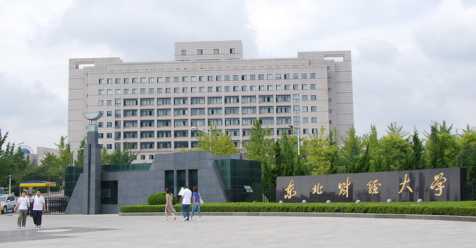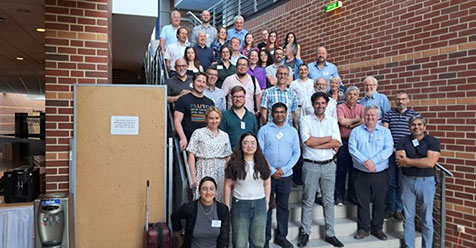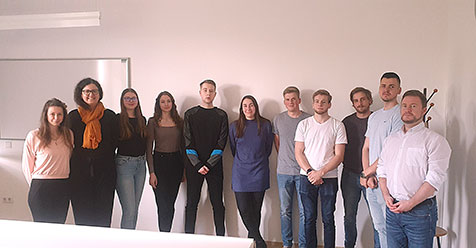Chinese visiting professor arrived for a year at GTK’s Department of Environmental Economics and Sustainability

Featured image: By Yoshi Canopus – Self-photographed, CC BY-SA 3.0, https://commons.wikimedia.org/w/index.php?curid=7724132
“Growth requires self-change, maturity requires understanding others, and success requires perseverance.”
Professor Xiaobo Chen, from Dongbei University of Finance and Economics (DUFE), has arrived at the Department of Environmental Economics and Sustainability as a visiting professor for one year under a Chinese research scholarship program.
In the fall of 2023, a delegation from DUFE visited the Faculty of Economic and Social Sciences (GTK), marking the beginning of exploring cooperation opportunities between the institutions. In the summer of 2024, further negotiations and site visits by the GTK delegation in China refined the details of the collaboration, with research being one of the key focus areas. The visiting professorship system effectively supports joint research topics and collaboration between researchers and research groups. Within this framework, Professor Xiaobo Chen has arrived at GTK to strengthen the professional relationship between the two institutions.
We asked the professor about professional, research, and personal topics, during which we also inquired whether he had any goals of learning the Hungarian language or gaining a deeper understanding of Hungarian culture.
Why did you decide to choose BME GTK as your visiting professorship location? How did you learn about the opportunities at BME GTK, and what attracted your interest?
The first time I heard about BME was when my colleague, Professor Tao, the director of our university’s international office, told me about a very good collaboration we would have with BME.
That was the first time I had heard about BME.
And then I visited BME’s website, and the first impression was very familiar. Why? The main reason is that I am a professional with an academic background in STEM (science, technology, engineering, mathematics). I was in the field of civil engineering from my undergraduate studies through to my PhD.
However, after I started working, I spent another ten years in the field of economic management and became a professor in this discipline.
BME and GTK perfectly align with my expertise —
a university with a strong background in science and engineering, and a faculty with a strong background in economics and management. It was the place I wanted to go.
Another important factor was the strong platform for friendly collaboration between our universities. Our university’s president, Professor Fang, had visited BME before, while Dr. Tamás Koltai, Dean of the GTK and Dr. Mária Szalmáné Csete, Vice Dean for International Affairs, visited our institution last summer. We had the opportunity to meet face-to-face in Dalian, which left a very good impression on me. Their strong support played an important role in making this visit a reality.
In summary, the key reason I chose to come to Hungary and to BME: “a good platform, a good place, and good people”.
I am looking forward to an exciting visiting year in Hungary, where I will leverage my professional expertise to engage in several scientific research and teaching collaborations while promoting further cooperation between our universities.
What factors were the most significant in your choice?
I think the most significant factor was the professional direction of the Department. I mainly conduct research in urban sustainable construction, sustainable investment in construction, sustainable development of the construction process, sustainable renovation of the built environment, and new energy policies.
The Department pays more attention to sustainable development issues, and I believe there are many intersections with my research. Moreover, under the framework of EU sustainable development, the Department has made many innovative research achievements, which I think is a great opportunity for my future research. During my stay here, I will primarily focus on the digital transformation of construction enterprises and its impact on green innovation, as well as researching European new energy policies.
Many information technologies have emerged in construction enterprises, such as the application of Building Information Modeling (BIM) and smart construction. These innovations have promoted green innovation within companies. Understanding these promotion mechanisms is essential. We mainly use the QCA (Qualitative Comparative Analysis) method to understand the impact of innovative mechanisms under various configurations, while also looking forward to publishing high-level papers.
What research projects are you currently working on, and do you plan to launch any new projects here?
Our research team (the professor has a research group of about 20 people at Dongbei University – ed.) collaborates extensively with the government and enterprises and has various projects. The current research projects include China-Europe offshore wind power management policy research, enterprise digital transformation and innovation research, application of building information modeling in medical buildings, deep foundation pit automation monitoring and early warning system research, as well as blockchain technology adoption decision-making system research.
I plan to conduct research on new energy policies and carbon tax-related issues in China and Europe. For example, how Europe promotes the development of renewable energy through policy formulation and advances sustainable economic and social development.
Additionally, there are incentive policies to promote renewable energy, such as the application of Contracts for Difference (CFD) and others. Furthermore, the mechanism of Carbon Border Adjustment Mechanism (CBAM) and how multinational corporations can better adapt to this policy.
How is the Department of Environmental Economics and Sustainability connected to your professional interests? What are the key topics or challenges in sustainable development that particularly interest you?
Last year, much of my research focused on offshore wind energy policies and how to promote sustainable economic and social development.
Additionally, our team has also been focusing on research related to urban resilience, and we have published papers on resilience assessment under urban flood disasters.
I believe that all these topics are related to sustainability and there are many intersections for collaboration with the Department.
Is there a research area in which you would like to collaborate with Hungarian colleagues?
I think there are mainly three aspects:
- The first one is how digital transformation of enterprises can promote green innovation in enterprises.
- The second one is the formulation of renewable energy policies and how to better promote sustainable economic and social development.
- The last one is the carbon tax mechanism of the European Union (Carbon Border Adjustment Mechanism-CBAM).
As a professor, what teaching methods do you find most effective?
I think case teaching is a more effective teaching method.
During the courses, it is important to teach with industry cases, especially focusing on the forefront of the industry. I believe this is particularly important to improve students’ understanding of the industry and to better master knowledge.
How do you see the role of intercultural connections in scientific collaboration?
Cross-cultural international cooperation is extremely important. First, researchers from different countries focus on different regional research issues, many of which are enlightening. For example, the application of renewable energy is important in both China and Europe, where governments and enterprises have adopted different approaches to promote and cooperate.
These collaborations face challenges as well, necessitating full cooperation of international teams to effectively advance the industry’s development.
At the same time, many scientific methods are commonly used by researchers, such as AI intelligent algorithms, econometric methods, structural equations, qualitative comparative analysis, etc. If we can apply these methods to new problems and new data, it will generate a lot of new research findings.
How do you see the handling of sustainability issues in the Hungarian and Chinese approaches? What differences or similarities have you experienced?
I believe that in sustainability, we share many concerns, such as carbon reduction measures to address climate change, the application of new energy sources, and the construction of resilient cities to face extreme disasters. These issues can all serve as topics for our research.
Is there an educational or research practice in China that you consider particularly valuable and think BME could successfully adopt?
In-depth cooperation between universities, the government, and enterprises is quite important for promoting education and scientific research.
Currently in China, there is a strong advocacy for multi-party collaboration to advance education. For instance, issues of significant concern to the government, scientific challenges that businesses need to overcome, and scientific research and teaching at universities are all closely interconnected. As an important direction for scientific research, this approach holds immense value for both student education and society as a whole.
Therefore, I suggest that universities should engage in deep collaboration to promote high-quality development in education.
How do you combine your research with teaching?
“Practice brings true knowledge” is a famous saying in China.
I think theory comes from practice. Practice means that we need to go deep into enterprises and society to conduct research, so that we can teach students with “the theories, cases and problems” that we discovered in the teaching process. This will be a very good way to integrate teaching and scientific research.
What professional experiences would you like to share with BME GTK students?
From my research experience, I have two insights to share:
- The first one is the importance of interdisciplinary collaboration, such as the integration of technical disciplines with economic management.
- The second one is the focus on integrating artificial intelligence methods with various disciplines to enhance intelligent solutions for professional problems.
Have you been to Hungary before, or is this your first visit? What was your first impression?
This is my first time in Europe and Hungary, but I have previously lived in the eastern and central parts of the United States for many years. Compared to that, life in Hungary is very convenient in terms of transportation. All facilities are foreigner-friendly, making it easy to adapt quickly.
My first impression of Hungary was that Budapest has a great number of beautiful buildings of historical significance. What impressed me the most was taking Tram 4 across the Danube River – the spectacular scenery and the clear blue sky were extremely impressive.
The city’s transportation infrastructure is highly developed, with buses and trams running on schedule. The city’s commercial centre has numerous supermarkets and is very foreigner friendly.
What cultural or professional experiences are you looking forward to during your stay here?
BME is very modern, with state-of-the-art facilities, and many of its disciplines are highly renowned, so I look forward to achieving fruitful results in scientific research cooperation with colleagues of BME. I am even more eager to learn about Hungarian culture and the cultures of European countries.
Hungarian music, such as Hungarian Dance No.5, is very famous in China, including the renowned composer Franz Liszt – all these are topics I wish to delve into.
Do you have a personal motto or philosophy that guides your work?
Growth requires self-change, maturity requires understanding others, and success requires perseverance.
What are your long-term goals in your professional career?
My goals are to serve society and educate students with professional knowledge, fully leverage my personal engineering and technical strengths, focus on economic management issues, solve real problems, and create social value.
What message would you share with students to inspire them in their studies?
“Want to do, can do, successfully done.”
Maintain curiosity, bravely innovate and try, and be able to persist in completing tasks step by step.



